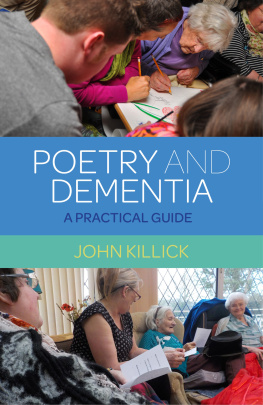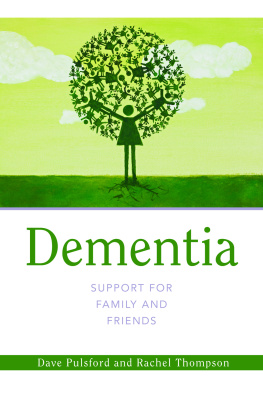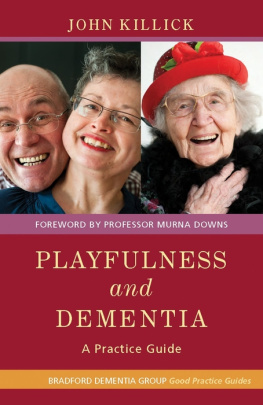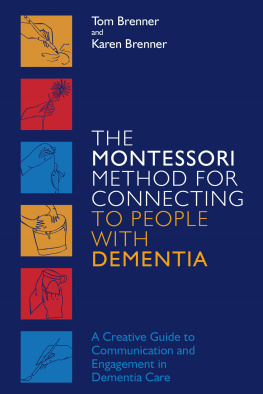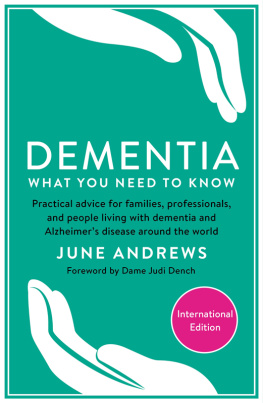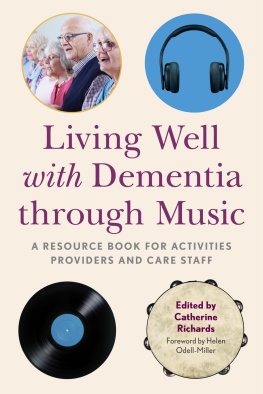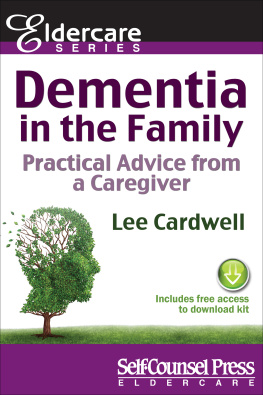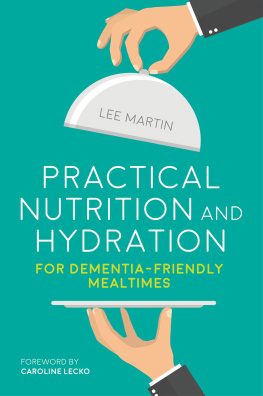Killick - Poetry and dementia: a practical guide
Here you can read online Killick - Poetry and dementia: a practical guide full text of the book (entire story) in english for free. Download pdf and epub, get meaning, cover and reviews about this ebook. City: London;England;Philadelphia;Pennsylvania, year: 2018;2017, publisher: Jessica Kingsley Publishers, genre: Detective and thriller. Description of the work, (preface) as well as reviews are available. Best literature library LitArk.com created for fans of good reading and offers a wide selection of genres:
Romance novel
Science fiction
Adventure
Detective
Science
History
Home and family
Prose
Art
Politics
Computer
Non-fiction
Religion
Business
Children
Humor
Choose a favorite category and find really read worthwhile books. Enjoy immersion in the world of imagination, feel the emotions of the characters or learn something new for yourself, make an fascinating discovery.
- Book:Poetry and dementia: a practical guide
- Author:
- Publisher:Jessica Kingsley Publishers
- Genre:
- Year:2018;2017
- City:London;England;Philadelphia;Pennsylvania
- Rating:3 / 5
- Favourites:Add to favourites
- Your mark:
- 60
- 1
- 2
- 3
- 4
- 5
Poetry and dementia: a practical guide: summary, description and annotation
We offer to read an annotation, description, summary or preface (depends on what the author of the book "Poetry and dementia: a practical guide" wrote himself). If you haven't found the necessary information about the book — write in the comments, we will try to find it.
Killick: author's other books
Who wrote Poetry and dementia: a practical guide? Find out the surname, the name of the author of the book and a list of all author's works by series.
Poetry and dementia: a practical guide — read online for free the complete book (whole text) full work
Below is the text of the book, divided by pages. System saving the place of the last page read, allows you to conveniently read the book "Poetry and dementia: a practical guide" online for free, without having to search again every time where you left off. Put a bookmark, and you can go to the page where you finished reading at any time.
Font size:
Interval:
Bookmark:

POETRY AND
DEMENTIA
A PRACTICAL GUIDE
JOHN KILLICK

Jessica Kingsley Publishers
London and Philadelphia
CONTENTS
CHAPTER ONE
INTRODUCTION
Why Poetry?
It is only comparatively recently (the past two decades essentially) that the arts have begun to be seen to have something significant for people with dementia. Exactly why this phenomenon occurs is still open to question. Amongst the theories which have been put forward are the following:
Dementia affects the reasoning capacity of individuals whereas the arts are fundamentally concerned with emotional expression.
Dementia causes changes in functioning which a person needs to attempt to come to terms with: the arts offer opportunities to explore personal issues both verbally and non-verbally.
Dementia often involves a degree of disinhibition, and this encourages the person to explore areas of activity where previously barriers may have existed.
Dementia is often accompanied by social withdrawal, and the arts provide opportunities for communal activity.
Dementia has consequences of loss of attainment in different areas of life for many people, and the arts can often involve new achievement goals.
It may be that the arts benefit from an amalgam of all of the above, and other characteristics of the condition and creativity coming together. There is a massive potential for contributions to wellbeing provided by this area of human activity.
Poetry, to which this book is dedicated, is, of course, only one artform, and it is limited to those who still retain verbal skills (though in terms of reading to individuals or groups, we shall see that many possibilities remain).
Language is of especial importance because it is the primary medium that we use throughout our lives to communicate with each other, and internally with ourselves.
A phenomenon which I have witnessed on many occasions is the extraordinary vividness of language used by many people with dementia. One illustration will suffice here, but the reader will encounter numerous instances as he or she works through these pages.
The following examples were collected in one day spent on a dementia assessment ward in a hospital:
You have to introduce yourself, otherwise it goes very brittle.
Ive travelled all my life choppy waters coming!
We are aware of our own awareness.
The forgetting is just as important as the learning.
Do you want the trees in the river or the river in the trees? You want both!
Lavender keep the smell for going home!
What we get round here is distractions, and its very difficult not to be distracted by a distraction.
My husband wrapped me up in silver foil, but then he died.
I was cherry blossoms best customer.
All these come from different people, and in the face of them it is difficult to avoid the conclusion that dementia does something special to the language and feeling processes of people. That is why we need to listen and learn and celebrate.
Karen Hayes is a widely experienced contributor in this field. A portrait she has contributed can be found later in this book. Her take on this language phenomenon is as follows:
People with dementia very often seem to see more than we do, to see through things, round things, past things. Their senses appear at times to be differently deployed so that they hear smells, see voices, taste pictures. They use metaphor as we might use observation, their linguistic range which to us without dementia may appear very strangely configured, is also fluid, generously, even lavishly, overlaid with imagery, freed from grammatical or chronological rules. It is already poetic in essence.
People with the condition can show us things we have never seen before, often about dementia, and help us to look at things in new ways which are a matter of common observation. The rest of this book is devoted to exploring ways to achieve this in a spirit of respectful relationship.
And here is the advocacy of Kate Swaffer, a younger person with dementia in Australia:
Poetry allows me to find true purpose in my experience of living with dementia, the good, the bad, and the downright ugly days. Poetry is, beyond any dreams, the one daily non-pharmacological intervention for dementia that brings the greatest meaning.
CHAPTER TWO
READING POETRY
Choosing Poems
Many people in adulthood have not developed the habit of reading. This can be true of prose, but is even more applicable to poetry. The poetry-reading public in most English-speaking countries is pitifully small. So why might one imagine that poetry would hold much appeal for people with dementia?
On the surface this question would appear to have logic on its side. But poetry has various characteristics which make an appeal to people with the condition. One which has already been referred to is its emotionality, which people find much more appealing and easier to deal with than intellectual argument. Here is a poem I have used with various individuals and groups, and which has never failed to elicit a response:
TREE AT MY WINDOW
Tree at my window, window tree,
My sash is lowered when night comes on;
But let there never be curtain drawn
Between you and me.
Vague dream-head lifted out of the ground,
And thing next most diffuse to cloud,
Not all your light tongues talking aloud
Could be profound.
But tree, I have seen you taken and tossed,
And if you have seen me when I slept,
You have seen me when I was taken and swept
And all but lost.
That day she put our heads together,
Fate had her imagination about her,
Your head so much concerned with outer,
Mine with inner, weather.
Robert Frost
I think this poem is an easy read, though the second line of the second verse can prove something of an obstacle. The third verse is really powerful and makes a big impact on people. The poem overall can just be read as a nature poem, with a moral the poet applies to himself, but I find that many people take it metaphorically, and see the parallel with dementia and their own struggles to come to terms with the changes being forced upon them.
Then there is the pattern-making of a poem which is satisfying in itself whatever the theme. Here is an example:
THE EARLY MORNING
The moon on the one hand, the dawn on the other:
The moon is my sister, the dawn is my brother.
The moon on my left and the dawn on the right.
My brother, good morning: my sister, good night.
Hilaire Belloc
The sheer musicality of this appeals, quite apart from the imagery. The balance of the phrases in each line and across the lines gives it an inevitability which helps it to stick in the mind.
Another characteristic of poetry which captures the imagination comes from the sheer virtuosity of the writing.
And then there is the poetry of entertainment, whether it exploits the humour of oddity, as in this poem of mine:
MONKEY PUZZLE
There was a monkey lived up a tree.
That tree it was a Monkey Puzzle.
And now I wonder which it might be:
Whether the Monkey Puzzled the tree
Or whether the tree Puzzled the Monkey?
Or the humour of deliberate absurdity as here:
CONTAGIOUS
Elephants are contagious!
Be careful how you tread
An Elephant thats been trodden on
Should be confined to bed!
Leopards are contagious too,
Be careful, tiny tots,
They dont give you a temperature
But lots and lots of spots.
Next pageFont size:
Interval:
Bookmark:
Similar books «Poetry and dementia: a practical guide»
Look at similar books to Poetry and dementia: a practical guide. We have selected literature similar in name and meaning in the hope of providing readers with more options to find new, interesting, not yet read works.
Discussion, reviews of the book Poetry and dementia: a practical guide and just readers' own opinions. Leave your comments, write what you think about the work, its meaning or the main characters. Specify what exactly you liked and what you didn't like, and why you think so.

